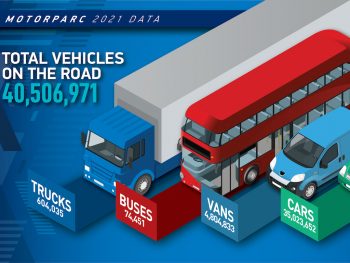The number of commercial vehicles on Britain’s roads has reached the highest level in history, accounting for more than one in eight vehicles in service.

Some 5,483,319 vans, trucks, buses and coaches were recorded in operation at the end of 2021, a 4.1% increase on the previous year, according to the new data from the Society of Motor Manufacturers and Traders (SMMT). This gives CVs a 13.5% share of the total 40,506,971-strong national fleet.
Vans remain the most popular type of commercial vehicle in operation, comprising 4,804,833 units, up 4.3% from 2020. However, while the segment has continuous growth since 2010, fleet renewal has slowed on the back of pandemic challenges and the semiconductor shortage.
As a result, the average van on UK roads is now a record 8.7 years old, although there are significant regional variations.
Zero-emission vehicle uptake is also increasing, although overall use remains at low levels. Some 26,990 plug-in vans are now in operation, equivalent to around one in 180, compared with around one in 50 in the car sector.
And with sales of both new cars and vans with conventional petrol and diesels due to end in 2030, the SMMT reiterated its call for a ‘van plan’ of infrastructure and incentives to match the commitments already made by the automotive industry.
Mike Hawes, SMMT chief executive, said: “Commercial vehicles keep Britain’s economy on the move, and their growing proportion of the national fleet underscores their increasing importance. Nurturing the green shoots of the sector’s transition to electrification, however, will need a dedicated strategy. Every stakeholder will need to play their part, matching the commitments made by the automotive sector, which is investing to offer an increased choice of zero-emission vans, trucks and buses to users even in the midst of global supply chain shortages.”

